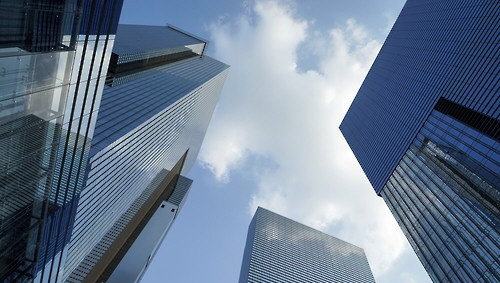Combined land assets held by Korea’s five-largest conglomerates increased 2.8fold in terms of gross book value in the 10 years leading up to 2017, a civic group said Tuesday.
The total value of land assets reported by Hyundai Motor, Samsung, SK, Lotte and LG to the financial authorities stood at 67.5 trillion won ($60.3 billion) as of late 2017, up from 24 trillion won in 2007, the Citizens’ Coalition for Economic Justice said in research released Tuesday.
 |
(Yonhap) |
As of late 2017, Hyundai Motor had land worth 24.7 trillion won, followed by Samsung (16.2 trillion won), SK (10.22 trillion won), Lotte (10.19 trillion won) and LG (6.3 trillion won).
Hyundai Motor also saw the greatest growth of land assets in the 10 years from 2007, with an increase of 19.4 trillion won, followed by Samsung (8.4 trillion won), SK (7.1 trillion won), LG (4.8 trillion won) and Lotte (4 trillion won).
“Chaebol have neglected their core businesses and contributed to the real estate bubble by focusing on speculation for 10 years,” the civic group said in a press release Tuesday morning.
By company, Hyundai Motor showed the sharpest increase in land assets at 10.6 trillion won, followed by Samsung Electronics (7.8 trillion won), Kia Motors (4.8 trillion won), Hotel Lotte (4.4 trillion won) and Hyundai Mobis (3.5 trillion won).
As of 2017, Korea’s top 10 companies registered at the National Tax Service held some 385 trillion won in publicly announced official value, up from 102 trillion won in 2007, according to the civic group.
The 10 companies, however, reported a total of 42 trillion won in land assets to the Financial Supervisory Service.
“The names of the 10 largest companies weren’t mentioned in the NTS data, but we believe they include multiple affiliates of the five-largest chaebol,” the civic group said.
“This clouds the judgment of shareholders and investors who review companies’ financial conditions based on what they have filed with the FSS, and indicates transparency issues.”
The civic group noted that conglomerates appear to be “obsessed with property speculation” as they made more money from rising land prices than from their businesses.
The civic group demanded that the government revise the fair trade law to make the regulatory filing of addresses, sizes, gross book value and the publicly announced value of property items mandatory for conglomerates with assets worth 5 trillion won.
By Kim So-hyun (
sophie@heraldcorp.com)







![[Today’s K-pop] Blackpink’s Jennie, Lisa invited to Coachella as solo acts](http://res.heraldm.com/phpwas/restmb_idxmake.php?idx=644&simg=/content/image/2024/11/21/20241121050099_0.jpg)
